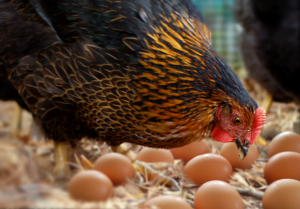If you’re raising chickens, one of the reasons that you probably started with chickens is so that you could have fresh eggs. It can be a bummer when your hens stop laying. What causes hens to stop laying eggs? Let’s dive into why birds will stop laying.
The Science of Why Birds Lay Eggs
In nature, most birds will lay eggs only in certain times of the year. They will lay eggs when it’s the best time to raise their young. The ‘best’ time depends on temperature, whether food is readily available and other factors from the environment. Some birds will lay as few as one egg per year while other types of birds will lay several clutches of eggs per year.
Chickens aren’t that far removed from wild birds. However, chickens were selectively bred over hundreds of years. People raising chickens would breed the hens that laid the most eggs, the most consistently. Over time, this developed birds that would lay nearly year-round.

Even though chickens have been bred to lay eggs consistently, that doesn’t mean that they aren’t affected by environmental conditions, just like their wild relatives. The process that produces an egg in a hen is sparked by melatonin production. We tend to think of melatonin as something that we need for proper sleep. In chickens, melatonin kick starts egg production. Melatonin is produced in the body when sunlight enters the eye. The amount of sunlight a chicken gets will determine how much melatonin her body produces. The more sunlight, the more melatonin she makes.
Why Hens Stop Laying
The most common reason that hens stop laying is because of the time of year. In the winter, there is less sunlight. This means that her body produces less melatonin, thus suppressing the egg production process. If you need farm fresh eggs through the winter, you can combat this by choosing cold-climate suited breeds or using a light in the coop at night. Keep in mind though that this is a normal process that also provides her body with a break.
But what if your hen stops laying unexpectedly, and the season isn’t to blame?
There are other reasons that hens can stop laying. Remember, birds in general tend to lay eggs when the conditions are most ideal for raising babies- the environment is right, low stress levels, ample food, etc. If your hens are getting all of this, that could be cause for egg production to stop.
First, make sure that your hens aren’t stressed. If there’s been a new addition to your flock, the stress could cause them to temporarily stop laying. If there has been a recent predator attack or scare, this could affect egg production.
Next, make sure that your chickens’ diet is balanced and that all of the birds in the flock are getting enough to eat. You may want to set out an extra feeder or two if you notice a hen that isn’t getting enough to eat.
Lastly, make sure that your hens are healthy and aren’t fighting off an illness. Sick hens generally don’t lay eggs, so treat any underlying issue that they could have going on. Decreased egg production is one of the first signs in many illnesses, so if you notice a dependable layer has suddenly stopped laying, keep a close eye on her.
Old age can also cause hens to stop laying or slow down. Most hens will start laying eggs when they’re around nine months old. At first, egg production may be spotty and over the course of a few months, her eggs will get more consistent in appearance and you’ll be able to determine how often she will lay. Egg production is the highest for the first couple of years of a hen’s life, then production starts to slowly decrease. If your hen is aging, her decreased production could simply be due to old age.
There are many reasons that your chickens could stop laying eggs. Winter decreases and decreases due to aging are expected. However, if one of those reasons doesn’t explain why your hen stopped laying, pay attention to your flock. Look for signs of stress, monitor feed intake and look for signs of illness. Fix any underlying issues quickly. Chickens are resilient and will start laying again soon.